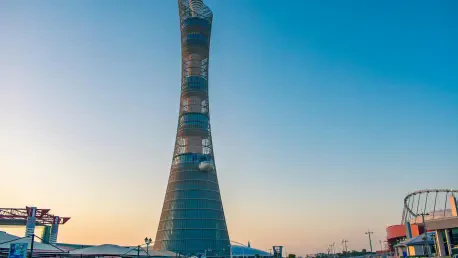Qatar has embarked on a monumental journey to cement itself as a key financial hub in the Middle East, ambitiously targeting a shift in the region’s economic balance. This is no small feat, with established giants like Dubai, Abu Dhabi, and Riyadh already dominating the arena with their established infrastructures and appealing lifestyles. At the heart of Qatar’s strategy is an enticing mix of fiscal incentives aimed at drawing foreign investment from finance-focused companies eager to set up shop in Doha. To achieve this vision, Qatar has strategically harnessed its vast Sovereign Wealth Fund, valued at a staggering $524 billion, dedicated to bolstering private equity and infrastructure funds that choose to establish in the country.
The Lusail Financial Services Package is a cornerstone initiative designed to elevate Qatar’s status as a financial powerhouse. This extensive program, valued in the billions, promises to cover up to 40% of investment costs for local businesses operating within the Lusail district over a five-year period. Qatar is simultaneously focusing on attracting sectors such as asset management, insurance, and fintech. The country’s proactive stance is further emphasized through its lack of restrictive regional policies, contrasting sharply with the headquarters license mandates enforced by Saudi Arabia. The welcoming business environment is already stirring interest from industry leaders such as Ashmore Group, BlackRock, Utopia Capital Management, and B Capital, pointing towards Qatar’s increasing promise in evolving its financial, geopolitical, and economic landscape.
Qatar’s Economic Positioning and Key Strategies
Qatar’s ambition to surpass its Gulf peers as a leading financial center finds expression not only in its intriguing incentives but also in its embrace of high-profile investment forums like the Qatar Economic Forum. These events, attended by major investors, serve as platforms to discuss significant investment drivers and government facilitation measures. The successful hosting of the 2022 FIFA World Cup, bolstered by a $300 million investment, coupled with the ongoing advancements in liquefied natural gas production, has notably bolstered Qatar’s economic credibility on the global stage. These moves do not just accentuate Qatar’s current economic maturity but underline its long-term trajectory to innovate and thrive amidst complex regional dynamics.
Despite significant progress, Qatar remains acutely aware of the inherent challenges in repositioning itself against established competitors. Its geopolitical role, although substantial, falls short in offering the same lifestyle and residency allure found in Dubai or Abu Dhabi. However, through a calculated series of national reforms and economic stimuli designed to address these shortcomings, Qatar is poised to play a more dynamic role in the region’s economic expansion. The willingness to adapt and evolve sets the stage for Qatar to emerge as a formidable player, thereby enhancing its financial stature on the global map. While challenges remain, Qatar’s strategic initiatives provide a robust framework for fostering continued growth and attracting new business ventures.
Advancing Towards Financial Innovation and Development
Qatar’s forward-thinking approach to financial sector development includes comprehensive reforms and infrastructure investments. Key reforms are strategically aligned to surpass regional competitors and to reshape Qatar as a dynamic financial nucleus in the Gulf. A marked shift towards technology and innovation underpins these efforts, with targeted initiatives in fintech and related sectors forming an integral part of the economic transformation. This committed pursuit of innovation is further reinforced by extensive collaborations and partnerships with both regional and international financial institutions, aiming to foster a thriving business ecosystem while simultaneously delivering robust regulatory framework enhancements.
In line with this pursuit, fostering an inclusive business climate remains a priority, as new industries and emerging technologies find fertile ground within Qatar’s evolving marketplace. This sustainable growth model is further strengthened by Qatar’s strategic focus on enhancing its workforce capabilities through education and skill development programs. By aligning its economic ambitions with the prerequisite of human capital enhancement, Qatar ensures that the workforce is equipped to meet the demands of an increasingly competitive financial sector. Such progressive endeavors underscore Qatar’s commitment to securing its position at the forefront of financial innovation, as it seeks to redefine its role on the global economic stage amidst continuing growth and transformation.
Future Considerations and Strategic Outcomes
Qatar is on an ambitious journey to solidify its status as a major financial hub in the Middle East, aiming to shift the economic balance dominated by cities like Dubai, Abu Dhabi, and Riyadh. These cities have long held sway with their well-established infrastructure and appealing lifestyles. Central to Qatar’s plan is a blend of fiscal incentives that lure finance-centric companies to Doha. The nation strategically leverages its Sovereign Wealth Fund, worth an impressive $524 billion, to support private equity and infrastructure funds setting up in the country.
A pivotal initiative is the Lusail Financial Services Package, valued in the billions, which supports local businesses in the Lusail area by covering 40% of investment costs over five years. Qatar’s focus on sectors like asset management, insurance, and fintech is clear. Unlike Saudi Arabia, which enforces strict headquarters licensing policies, Qatar promotes a business-friendly atmosphere. This approach has caught the attention of industry leaders like Ashmore Group, BlackRock, Utopia Capital Management, and B Capital, enhancing Qatar’s role in the financial landscape.









